 My sixty-three years remembers 1958 when Sister said go and we slid from our seats and crouched under desks. I covered my head and looked to see if my friends were doing the same. We smiled at each other. Sometimes in the hallways, crouched against the wall, waiting for the all clear, we watched blue-robed Sister slide back and forth above us. They had power in those blue robes. I thought, “Sisters can live through atom bombs.” We were told that bombs could come from the Communists. I think my parents worried, but I do not remember seeing them worry.
My sixty-three years remembers 1958 when Sister said go and we slid from our seats and crouched under desks. I covered my head and looked to see if my friends were doing the same. We smiled at each other. Sometimes in the hallways, crouched against the wall, waiting for the all clear, we watched blue-robed Sister slide back and forth above us. They had power in those blue robes. I thought, “Sisters can live through atom bombs.” We were told that bombs could come from the Communists. I think my parents worried, but I do not remember seeing them worry.
One book we read had pictures of Chinese Communists holding rifles with bayonets and pointing them at women with children. They were so awful. One friend said they tied together the legs of mothers giving birth. I knew this was terrible. I did not know why.
The Russians might send bombers. Khrushchev was bald and wore baggy suits like clowns wore. We crouched under desks and smiled at each other. We saw our fathers go to work in the morning. They came home at night. Our mothers smiled at us when we walked into the kitchen after school.
Through the big windows of our first grade classroom, to the north, we could see a big factory with tall smokestacks, a big clock and a noon lunch whistle. Every day lots of men and women walked in there. We watched them when we left our buses in the morning, during recess, walking to Mass, leaving at 3.
At home our childhoods were graced with woods and a transcendent freedom — in the summer we left our homes in the morning and returned for dinner. We wandered. No one kept track. No one organized us.
We played baseball on concrete and the balls we hit cracked off the wall of the public school far away. I rolled around on that concrete with a boy who called me a fish-eater. We tried to hit each other.
We played basketball on pitted, sloping courts. I learned that it felt glorious to jump and feel the ball slide off my hand and then make the net hiss when it cut the hoop without touching a thing.
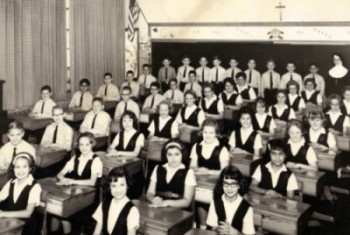 There was always work. In high school and college we filled in factory jobs for vacationing men. We hauled steel and operated big metal cutters in truck suspension plants, took stock, stocked shelves, served cokes, bagged vegetables, stood in heat as flagmen and shovelers for the Highway Department, wrapped hams and loaded trucks in meat packing plants, were doused in chemicals and fumes everywhere we punched a clock, scraped the inside of three story flour bins while suspended on bosun’s chairs, cleaned Schuylkill river mud from warehouses after Hurricane Agnes. When we came home, our mothers laughed and hosed us down in the backyard.
There was always work. In high school and college we filled in factory jobs for vacationing men. We hauled steel and operated big metal cutters in truck suspension plants, took stock, stocked shelves, served cokes, bagged vegetables, stood in heat as flagmen and shovelers for the Highway Department, wrapped hams and loaded trucks in meat packing plants, were doused in chemicals and fumes everywhere we punched a clock, scraped the inside of three story flour bins while suspended on bosun’s chairs, cleaned Schuylkill river mud from warehouses after Hurricane Agnes. When we came home, our mothers laughed and hosed us down in the backyard.
Taught by nuns and priests, we learned how to think in double ways — what we felt and what they wanted — but some of them rose above the ordinary and changed everything with one sentence of encouragement or a steady, graceful attention or with that rarest of adult qualities, authentic wisdom.
We loved basketball and cold fall nights in stadiums watching our friends smash the ‘publics’ in football. We loved the electricity of being young, of guitars, of young women, of losing our minds in every cautious way. We loved movies and music. We loved our father’s cars — of driving in the night and talking sincere shit about the world we would change. We covered every fugitive fantasy. We wanted to escape the town, our parents, our safe, bantam lives. We wanted to get bigger. We wanted something we did not know but only knew it must be new.
Like cells we split our lives away from those we knew and at college drifted, became more aware, performed death-defying feats of impressive stupidity, found something luminous in a few classrooms and liked its brilliance. We fell in love, were jilted, came back. We began to figure out how to fail and then learned how to prevail, sometimes. We divided again, taking more DNA with us — books, a few friends, events that mattered; we were finally ‘becoming’.
Even then, TV showed us burning cities and the funerals of good men. Much later we watched a real-time collapse of towers and thus entered the time of endless war.
We found work as fathers, mothers, the founders of schools, the heads of schools, heads of sales, chemists, builders, bankers, engineers, cops and lawyers, businessmen and doctors, coaches, teachers and drivers. We wanted to become those who mattered and so had faith we knew what all of this was about. We grew serious. We inherited our fathers’ desire to work. Later, we hoped we had received our mothers’ patience and perceptive hearts. We married. Children appeared and produced a disbelief made of so many variations we could only name a handful — both a fear beyond the power of language to describe, deeper than any device could measure, and a love both perfect and complete. Their daily journeys produced a stunned awareness that they were subject to the complete hegemony of circumstance and whim. They grew, some into strangers, some into paragons, but they all left on their own runs of fortune, luck and will.
We divorced, remarried, were widowed, cobbled together a fourth or fifth or sixth beginning. Some of us began to die too early. Some drank too much. Some came back to Mass, the Church, prayer, Jesus, relief. Some found solace in grandchildren. We hoped we knew what all this was about. We were no longer sure of much of anything.
The whole world had increased its speed, especially the days, which disappeared, which evaporated, and unless one tried to record them, to set down moments of each, they left no residue as if they had never been lived.
At 63 we have spent years gazing into screens. What we see is terrifying: American life breaking into fragments, the air filled with competing certainties: “We alone know the truth. Heretics are everywhere.” A political class of con-artist sociopaths — the vicious, the profoundly dim, and some who merely yearn to be the tool of the powerful. We saw police officers murdered. Black men, murdered. Now we could actually watch human beings hunted in the streets. Everywhere the ice is melting, the seas heating, animals vanishing, and millions of children and families walking away from barrel bombs, beheadings, starvation, poverty, drought. We freeze to listen when bulletins flash on-screen, holding fast inside, waiting for the next catastrophe. And looking on at our forever refreshed American paranoia and absurd innocence are the real powers of capitol, those who care nothing for flags or pity or actual human beings but only about the eternal and amoral flow of money, the great ocean currents of it, global in their reach and adamantine destiny.
For most, a haunted normalcy endures. Routines have grown into our comfort and balm, but who does not sense the play of titanic forces in the air and under our feet, the resonances of their movements visible in our collective disquiet? So we pursue stuff, the new happiness, until our garages fill, our attics heave lower, our cellars grow fat with it.
Auden knew that we most wanted “to be loved alone“. Thus, the great inward turning, the desire to find a secure place to keep those faces and bodies we find most familiar and dear. Thus the willingness of some to listen to those who promise that they will make us safe, ‘our people’ especially. Thus the desire to believe in better lives to be lived in simpler worlds, and in sanctuary too. These are anxious days.
Whatever time is left at 63 I try to cultivate, but so often foolishly, too dreamy still and still poorly resisting all the distractions out there. Perhaps because of that weakness, it has become more important to figure out how to boil life down to its fundamentals, its principles as opposed to its incidentals — not to sleepwalk through the day, not to oversimplify, but to make the effort to see what is real rather than what I want to be real. Like my father, as I age I find myself growing quieter. I prefer to listen more than speak — there is so much I do not know, have not read, have not done.
Others often show a path to those fundamentals without realizing they are doing so.
I once heard an old-timer refer to someone he admired as having “sand”, the resilience to go on without giving in to despair or cheap cynicism. Most every day I talk to a man who has borne sorrows so heavy they seem Biblical — one child murdered, another crippled in an accident, and fresh burdens as well, but he laughs, finds delight in his grandchildren, measures the rainfall, watches deer, tells stories. At a high school reunion recently I met again Sister Regina, all Irish fire and close to 80, who still works with children at a school that welcomes the poorest of the poor as its students. She has neither given in to age nor its general erosion of spirit.
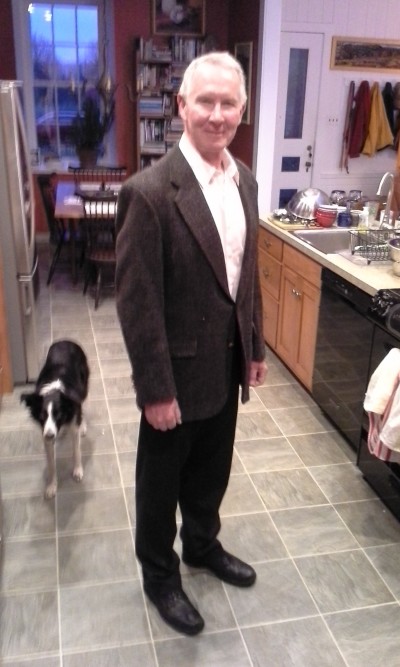 (friend) and Antique, November 2015
(friend) and Antique, November 2015
Are you too often encouraged by the unexpected ‘kindness of strangers’? Everyday, do you too see those who do what they can in their modest lives (our modest lives) to fight off the end of the world? Who remember to smile and be thankful? These are daily gifts.
Yet in spite of our efforts to search out any good news, or a place of certain refuge, we all feel something out there in the Republic has broken and let fire pieces into the air, and that we have begun to hear the whirring sound of their descent.
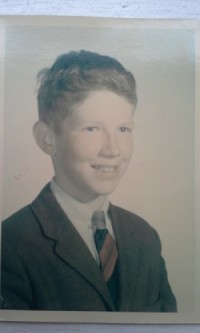
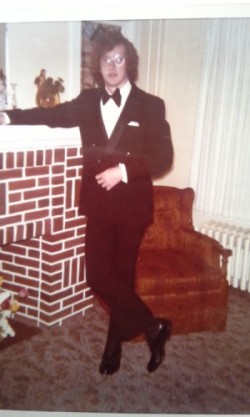
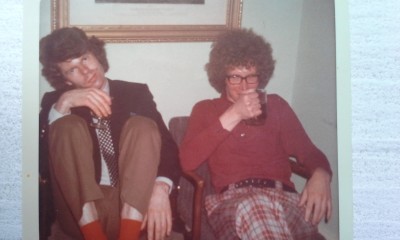
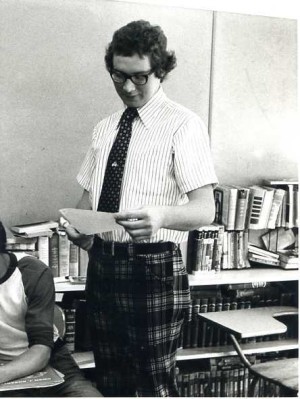
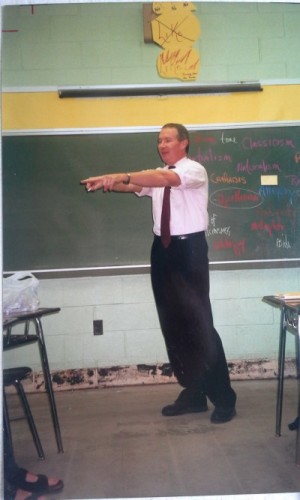
Great read. Remind me of some interesting memories.
This brought back a lot of good memories from our childhood–it doesn’t seem like that long ago……..
With the exception of the nuns this brings back memories of growing up in Shillington, raising my own family and what possibly lies ahead. Thanks for sharing.
Wonderful. Mike,you are truly the kindest person I know. I am so proud to be your sister.